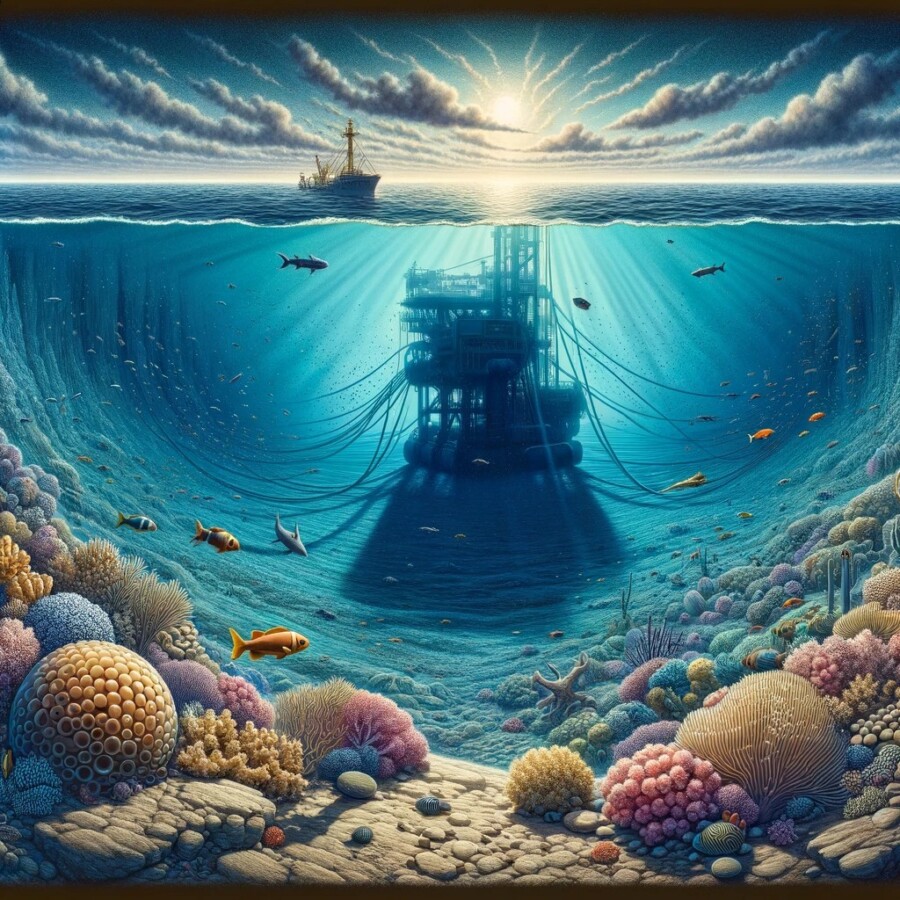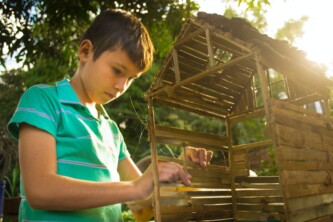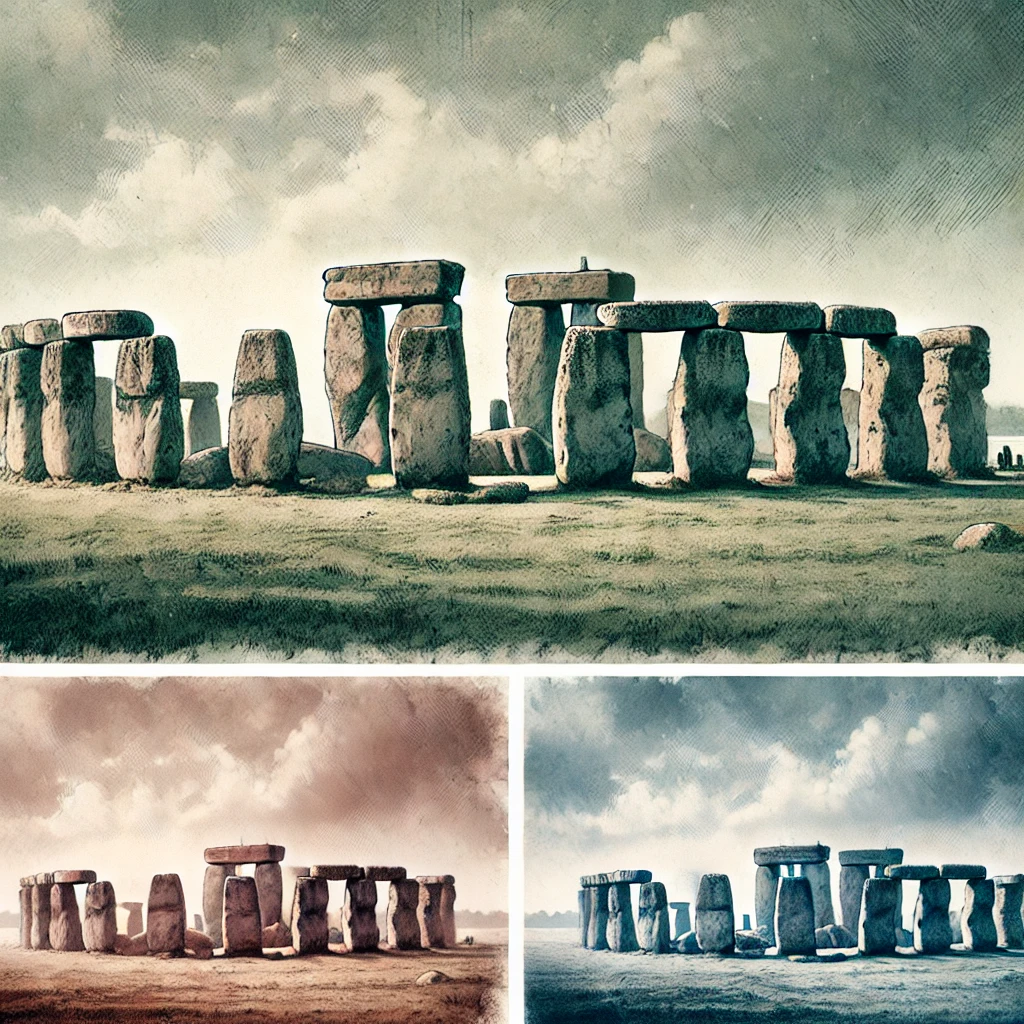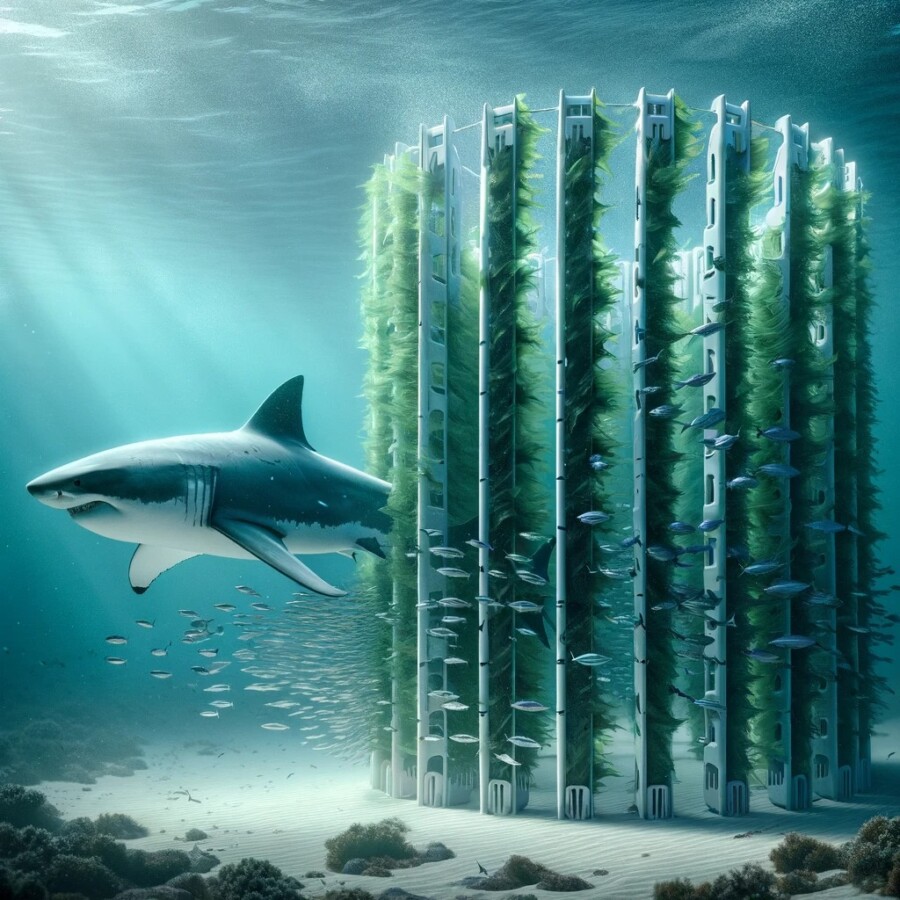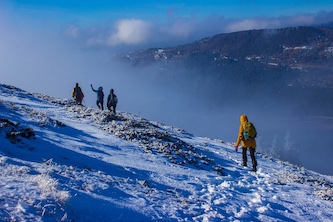Some people think digging for minerals under the sea is a good idea because we need them for things like batteries. A company called The Metals Company says they can get these rocks from the sea without hurting the ocean too much. They use special machines that are controlled from far away to pick up the rocks. But some countries, like the UK, Brazil, and Germany, don’t want this to happen because they are worried it could hurt the water and everything living in it.
Groups that care about nature, like the WWF and EASAC, say that digging in the sea is bad for fish and plants there. They are scared that it could ruin the homes of sea creatures and even wipe out some kinds of animals. The EASAC also thinks we don’t really need to dig in the sea because we already have enough minerals. They say we should focus on recycling and finding new ways to do things instead of looking for more minerals under the sea.
A man named Gerard Barron, who works for the mining company, thinks that mining deep in the sea is not as bad as mining on land. He says there are not many living things deep in the sea, but there are lots of plants and animals where they dig for minerals on land, like in rainforests. Still, people who don’t like sea mining say we should try to use less minerals and recycle more. Right now, a big group called the ISA is trying to decide if they will let companies dig in the sea, and no one knows what they will decide.
Original news source: Is seabed mining an economic necessity or a hazard? (BBC)
🎧 Listen:
Slow
Normal
Fast
📖 Vocabulary:
| 1 | minerals | Things found in the earth that are used to make stuff |
| 2 | batteries | Things we use to store and give power to our gadgets |
| 3 | machines | Big tools that do work for us |
| 4 | controlled | Being in charge of something from a distance |
| 5 | creatures | Animals, especially those that are not people or plants |
| 6 | wipe out | To completely remove or destroy |
| 7 | recycling | Using things again instead of throwing them away |
| 8 | mining | Digging in the earth to find things like coal or gold |
| 9 | rainforests | Thick forests in tropical areas with lots of rain and many kinds of plants and animals |
| 10 | focus | To pay special attention to something |
| 11 | ISA | A group that makes rules about what people can do in the ocean |
| 12 | decide | To make a choice or come to a conclusion |
Group or Classroom Activities
Warm-up Activities:
– Charades
Instructions: Divide the class into two teams. Write the vocabulary words from the article on small pieces of paper and put them in a hat. Each team takes turns sending one person to pick a word from the hat and act it out without speaking. The team members must guess the word within a certain time limit (e.g., 1 minute). The team that guesses the most words correctly wins.
– News Summary
Instructions: In pairs, students take turns summarizing the main points of the article to their partner. Each student has 1 minute to give a brief summary, using their own words. After both students have had a turn, they can discuss any differences in their summaries and clarify any points they may have missed.
– Vocabulary Pictionary
Instructions: Write the vocabulary words from the article on the board. Divide the class into small groups. Each group takes turns sending one person to choose a word and draw it on the board without speaking. The rest of the group must guess the word within a certain time limit (e.g., 1 minute). The group that guesses the most words correctly wins.
– Pros and Cons
Instructions: Divide the class into two groups. One group will discuss the pros of digging for minerals under the sea, while the other group will discuss the cons. Give the groups some time to brainstorm and write down their ideas. Then, have a class discussion where each group shares their points and tries to convince the other group of their position. Encourage students to use the vocabulary and arguments from the article in their discussion.
– Opinion Spectrum
Instructions: Create a line on the board with “Strongly Agree” on one end and “Strongly Disagree” on the other end. Read a statement related to the article, such as “Digging for minerals under the sea is necessary for our future needs.” Ask students to stand along the line based on their opinion, with “Strongly Agree” on one side and “Strongly Disagree” on the other side. Students can then take turns explaining their position and discussing with others who have different opinions. Encourage them to use the vocabulary and arguments from the article in their discussion.
🤔 Comprehension Questions:
1. Why do some people think it’s a good idea to dig for minerals under the sea?
2. How does The Metals Company pick up the rocks from the sea?
3. Why are some countries like the UK, Brazil, and Germany against digging for minerals under the sea?
4. Why do groups like the WWF and EASAC think digging in the sea is bad for fish and plants?
5. What does the EASAC suggest we should focus on instead of digging in the sea?
6. According to Gerard Barron, why does he think mining deep in the sea is not as bad as mining on land?
7. What is the big group called that is trying to decide if companies can dig in the sea?
Go to answers ⇩
🎧✍️ Listen and Fill in the Gaps:
Some people (1)______ digging for minerals under the sea is a good idea because we need them for things like batteries. A company called The Metals Company says they can get these rocks from the sea without hurting the (2)______ too much. They use special machines that are controlled from far away to pick up the rocks. But some (3)______, like the UK, Brazil, and Germany, don’t (4)______ this to happen because they are worried it could (5)______ the water and everything living in it.
Groups that care about nature, like the WWF and EASAC, say that digging in the sea is bad for fish and plants there. They are scared that it could ruin the homes of sea creatures and even (6)______ out some kinds of animals. The EASAC also thinks we don’t really need to dig in the sea because we already have enough minerals. They say we should focus on recycling and finding new ways to do things instead of looking for more minerals under the sea.
A man named (7)______ Barron, who works for the mining company, (8)______ that mining deep in the sea is not as bad as mining on (9)______. He says there are not many living things deep in the sea, but there are lots of (10)______ and animals where they dig for minerals on land, like in rainforests. Still, people who don’t like sea mining say we should try to use less minerals and recycle more. Right now, a big group called the ISA is (11)______ to decide if they will let companies dig in the sea, and no one (12)______ what they will decide.
Go to answers ⇩
💬 Discussion Questions:
Students can ask a partner these questions, or discuss them as a group.
1. What are some things that we need minerals for?
2. How do you think the special machines pick up rocks from the sea?
3. How do you think digging in the sea could hurt the water and everything living in it?
4. Why do you think groups like WWF and EASAC think digging in the sea is bad for fish and plants?
5. What are some ways that digging in the sea could ruin the homes of sea creatures?
6. Why do you think the EASAC believes we don’t need to dig in the sea?
7. Why does Gerard Barron think mining deep in the sea is not as bad as mining on land?
8. Why do people who don’t like sea mining think we should use less minerals and recycle more?
9. How do you think we can use less minerals in our daily lives?
10. Do you think the ISA should allow companies to dig in the sea? Why or why not?
11. How would you feel if you lived near an area where they were digging for minerals in the sea?
12. Do you think it’s more important to find new ways to do things or to keep digging for minerals? Why?
Individual Activities
📖💭 Vocabulary Meanings:
Match each word to its meaning.
Words:
1. minerals
2. batteries
3. machines
4. controlled
5. creatures
6. wipe out
7. recycling
8. mining
9. rainforests
10. focus
11. ISA
12. decide
Meanings:
(A) Animals, especially those that are not people or plants
(B) Things found in the earth that are used to make stuff
(C) To make a choice or come to a conclusion
(D) Digging in the earth to find things like coal or gold
(E) Thick forests in tropical areas with lots of rain and many kinds of plants and animals
(F) To completely remove or destroy
(G) Big tools that do work for us
(H) Being in charge of something from a distance
(I) Using things again instead of throwing them away
(J) A group that makes rules about what people can do in the ocean
(K) To pay special attention to something
(L) Things we use to store and give power to our gadgets
Go to answers ⇩
🔡 Multiple Choice Questions:
1. Why do some people think digging for minerals under the sea is a good idea?
(a) It’s fun to dig in the sea.
(b) We need minerals for things like batteries.
(c) The ocean doesn’t have any minerals.
(d) It’s a way to hurt the water.
2. How does The Metals Company get rocks from the sea?
(a) They use fishing nets to catch the rocks.
(b) They hire scuba divers to collect the rocks.
(c) They ask the fish to bring them the rocks.
(d) They use special machines controlled from far away.
3. Why are some countries like the UK, Brazil, and Germany against digging for minerals in the sea?
(a) They want to keep all the minerals for themselves.
(b) They don’t need minerals for anything.
(c) They want to protect the sea creatures.
(d) They are worried it could hurt the water and everything living in it.
4. Why do groups like the WWF and EASAC think digging in the sea is bad?
(a) They think it could ruin the homes of sea creatures and wipe out some animals.
(b) They want to use more minerals from the sea.
(c) They believe there are no minerals in the sea.
(d) They want to protect the rocks in the sea.
5. What does the EASAC suggest we do instead of digging for minerals in the sea?
(a) Keep digging for minerals in the sea.
(b) Stop using minerals altogether.
(c) Focus on recycling and finding new ways to do things.
(d) Start digging for minerals on land.
6. Why does Gerard Barron think mining deep in the sea is not as bad as mining on land?
(a) There are lots of minerals deep in the sea.
(b) There are no minerals on land.
(c) There are not many living things deep in the sea.
(d) There are no living things deep in the sea.
7. What do people who don’t like sea mining suggest we do?
(a) Use more minerals and recycle less.
(b) Use less minerals and recycle more.
(c) Dig for minerals in the sea and on land.
(d) Stop using minerals altogether.
8. Who is trying to decide if companies can dig in the sea?
(a) A big group called the ISA.
(b) The fish in the sea.
(c) The WWF and EASAC.
(d) Gerard Barron.
Go to answers ⇩
🕵️ True or False Questions:
1. The Metals Company claims that they can extract these rocks from the sea without causing too much harm to the ocean.
2. The company manually collects the rocks without using any special machines.
3. However, countries like the UK, Brazil, and Germany are opposed to sea mining because they are concerned about the potential harm to the water and its inhabitants.
4. The EASAC argues that we still need more minerals and should prioritize mining in the sea instead of recycling and finding alternative methods.
5. The International Seabed Authority (ISA) has already made the decision to allow companies to mine in the sea, and the outcome is not uncertain.
6. They are not concerned about the potential destruction of habitats of sea creatures or the risk of species extinction.
7. Some people believe that mining for minerals under the sea is a good idea because we need them for things like batteries.
8. Environmental groups such as the WWF and EASAC believe that mining in the sea is detrimental to fish and plants living there.
Go to answers ⇩
📝 Write a Summary:
Write a summary of this news article in two sentences.
Check your writing now with the best free AI for English writing!
Writing Questions:
Answer the following questions. Write as much as you can for each answer.
Check your answers with our free English writing assistant!
1. Why do some people think it’s a good idea to dig for minerals under the sea?
2. What is The Metals Company using to pick up the rocks from the sea?
3. Which countries don’t want companies to dig for minerals under the sea?
4. Why do groups like the WWF and EASAC think digging in the sea is bad?
5. What does Gerard Barron think about mining deep in the sea compared to mining on land?
✅ Answers
🤔✅ Comprehension Question Answers:
1. Why do some people think it’s a good idea to dig for minerals under the sea?
Some people think it’s a good idea because we need the minerals for things like batteries.
2. How does The Metals Company pick up the rocks from the sea?
They use special machines that are controlled from far away to pick up the rocks.
3. Why are some countries like the UK, Brazil, and Germany against digging for minerals under the sea?
They are worried it could hurt the water and everything living in it.
4. Why do groups like the WWF and EASAC think digging in the sea is bad for fish and plants?
They are scared that it could ruin the homes of sea creatures and even wipe out some kinds of animals.
5. What does the EASAC suggest we should focus on instead of digging in the sea?
They suggest we should focus on recycling and finding new ways to do things instead of looking for more minerals under the sea.
6. According to Gerard Barron, why does he think mining deep in the sea is not as bad as mining on land?
He says there are not many living things deep in the sea, but there are lots of plants and animals where they dig for minerals on land, like in rainforests.
7. What is the big group called that is trying to decide if companies can dig in the sea?
The big group is called the ISA.
Go back to questions ⇧
🎧✍️✅ Listen and Fill in the Gaps Answers:
(1) think
(2) ocean
(3) countries
(4) want
(5) hurt
(6) wipe
(7) Gerard
(8) thinks
(9) land
(10) plants
(11) trying
(12) knows
Go back to questions ⇧
📖💭✅ Vocabulary Meanings Answers:
1. minerals
Answer: (B) Things found in the earth that are used to make stuff
2. batteries
Answer: (L) Things we use to store and give power to our gadgets
3. machines
Answer: (G) Big tools that do work for us
4. controlled
Answer: (H) Being in charge of something from a distance
5. creatures
Answer: (A) Animals, especially those that are not people or plants
6. wipe out
Answer: (F) To completely remove or destroy
7. recycling
Answer: (I) Using things again instead of throwing them away
8. mining
Answer: (D) Digging in the earth to find things like coal or gold
9. rainforests
Answer: (E) Thick forests in tropical areas with lots of rain and many kinds of plants and animals
10. focus
Answer: (K) To pay special attention to something
11. ISA
Answer: (J) A group that makes rules about what people can do in the ocean
12. decide
Answer: (C) To make a choice or come to a conclusion
Go back to questions ⇧
🔡✅ Multiple Choice Answers:
1. Why do some people think digging for minerals under the sea is a good idea?
Answer: (b) We need minerals for things like batteries.
2. How does The Metals Company get rocks from the sea?
Answer: (d) They use special machines controlled from far away.
3. Why are some countries like the UK, Brazil, and Germany against digging for minerals in the sea?
Answer: (d) They are worried it could hurt the water and everything living in it.
4. Why do groups like the WWF and EASAC think digging in the sea is bad?
Answer: (a) They think it could ruin the homes of sea creatures and wipe out some animals.
5. What does the EASAC suggest we do instead of digging for minerals in the sea?
Answer: (c) Focus on recycling and finding new ways to do things.
6. Why does Gerard Barron think mining deep in the sea is not as bad as mining on land?
Answer: (c) There are not many living things deep in the sea.
7. What do people who don’t like sea mining suggest we do?
Answer: (b) Use less minerals and recycle more.
8. Who is trying to decide if companies can dig in the sea?
Answer: (a) A big group called the ISA.
Go back to questions ⇧
🕵️✅ True or False Answers:
1. The Metals Company claims that they can extract these rocks from the sea without causing too much harm to the ocean. (Answer: True)
2. The company manually collects the rocks without using any special machines. (Answer: False)
3. However, countries like the UK, Brazil, and Germany are opposed to sea mining because they are concerned about the potential harm to the water and its inhabitants. (Answer: True)
4. The EASAC argues that we still need more minerals and should prioritize mining in the sea instead of recycling and finding alternative methods. (Answer: False)
5. The International Seabed Authority (ISA) has already made the decision to allow companies to mine in the sea, and the outcome is not uncertain. (Answer: False)
6. They are not concerned about the potential destruction of habitats of sea creatures or the risk of species extinction. (Answer: False)
7. Some people believe that mining for minerals under the sea is a good idea because we need them for things like batteries. (Answer: True)
8. Environmental groups such as the WWF and EASAC believe that mining in the sea is detrimental to fish and plants living there. (Answer: True)
Go back to questions ⇧



